Civil Liberties, Criminalizing Dissent, Crony Capitalism, Green Scare, Habeas Corpus, Human Rights, Political Prisoner, Prison Industry, Targeting Muslims, Torture, Truth to Power
Podcast: Play in new window | Download
Updates:
—–


Court Vindicates Prisoners in Right to Challenge Federal Experimental Isolation Units Restricting Communication
Last month, the Center for Constitutional Rights won the right for prisoners to challenge a violation of their constitutional rights. Prisoners in 2 experimental federal prison units called “Communications Management Units” or CMUs, will have their claims heard in court. About 70 percent of CMU prisoners are Muslim men. Judge Urbina agreed that the prisoners raised serious constitutional questions about CMUs. The Center for Constitutional Rights filed Aref v. Holder in the D.C. District Court on behalf of current and former prisoners of the units in Terre Haute, IN and Marion, IL; two other plaintiffs are the spouses of those prisoners.
As many listeners may know, these CMUs were secretly opened under the Bush administration in 2006 and 2007. They were designed to monitor and control the communications of certain prisoners and to isolate them from other prisoners and the outside world. The five plaintiffs in Aref were designated to the two CMUs despite having relatively or totally clean disciplinary histories, and none of the plaintiffs have received any communications-related disciplinary infractions in the last decade.
In addition to heavily restricted telephone and visitation access, CMU prisoners are categorically denied any physical contact with family members and are forbidden from hugging, touching or embracing their children or spouses during visits.
Attorney Alexis Agathocleous:
- We’re very troubled about policies and conditions at these units. A number of the restrictions imposed at the CMUs are severe. They are truly cutting people off from their loved ones, they’re community and the outside world
- Blanket ban on physical contact, unparalleled to any other single unit anywhere, including Supermax.
- We feel this needlessly impinges on their right to family integrity and their need to maintain these ties to the outside world.
- What we’re challenging is that there is no due process attached to designation to these (CMU) units.
- Without a disclosure of factual allegations that were used to designate them, without a demonstration of past abuse of communication devices, without a hearing, without an appeal. Once you’re there, no one is told how to earn their transfer to get out. Our clients have benign or in some cases perfectly clean histories.
- What is happening is that Muslim prisoners are being designated there, based on the discriminatory belief that as Muslims they inherently pose a great danger to institutional security, than do other prisoners.
- We’re very concerned also about a pattern of designation of political prisoners and specifically includes environmental and animal rights activists.
- We do believe these are acts of retaliation for protected First Amendment activity, such as speaking out on social justice issues.
- What we’ve asked for in the case is a thorough review of polices and practices in the CMUs.
- What’s next is we’re going into discovery, which is our opportunity to learn a lot more about the CMUs, about their inception, who was involved in designing them and why and about how designations are made.
- CMUs were opened quietly.
Guest – Alexis Agathocleous, staff Attorney at the Center for Constitutional Rights and works on CCR’s Government Misconduct and Racial Justice docket. He is lead counsel in Aref v. Holder, challenging policies and conditions at the federal Bureau of Prisons’ Communications Management Units, and Doe v. Jindal, challenging a Louisiana law that requires individuals convicted of Crime Against Nature to register as sex offenders.
—–


Financial Regulators Failed: Crooks Go Unpunished
Last week, the Securities and Exchange Commission Friday charged Goldman Sachs & Co. and one of its executives with fraud in a risky offshore deal backed by subprime mortgages that cost investors more than $1 billion. The SEC also contends that Goldman allowed a client, Wall Street hedge fund Paulson & Co., to help select the securities to be sold. Paulson in turn bought insurance against the deal and when the securities sank, losing nearly all value, Paulson then made a $1 billion profit.
While these are not criminal charges, the recently released 650-page report of the Senate Permanent Subcommittee on Investigations, Wall Street and the Financial Crisis (PDF) had exposed the deceptive and risky practices within major financial institutions, that deceived clients and the public. New Economics Perspective Blog
Professor William K. Black:
- Many people still call it the subprime crisis, it would be far better to call it, the liar’s loan crisis.
- Roughly half of all subprime loans by 2006.
- Somewhere between a quarter and 49 percent of new home loans, were in the form of liar’s loans.
- The incidence of fraud when there have been independent studies has ranged from 90 to 100 percent.
- A liar’s loan is when there is no underwriting, no verification of what’s put into the loan application.
- Overwhelmingly, it was the lenders who put the lie is liar’s loans.
- You can sell these loans in the secondary market if they appeared to have 2 characteristics that finance has told us you can’t have simultaneously.
- A premium interest rate and low risk. You could have the best of both worlds. The way to do that was to gimmick two ratios. Debt to income ratio and loan to value ratio.
- Inflating the value of homes, covered up by industry. An honest secure lender would never inflate value.
- It makes perfect sense for a fraudulent company to inflate the value of the house so they can sell the loan on the secondary market for a higher profit.
- Then Attorney General Cuomo, now governor found this as a common practice at Washington Mutual, the biggest bank failure. WAMU had a blacklist of appraisers, you were blacklisted if you refused to inflate value of property. None of these people are being prosecuted.
- In 2004, the FBI testified there was an epidemic of mortgage fraud and predicted that it would cause a financial crisis.
- The Savings and Loans debacle cost 150 billion, the current crisis is costing over 10 trillion.
- The Office of Thrift Supervision, Chainsaw James Gilleran
- Instead of being embarrassed that they were working hand in glove with the lobbyists, they were proud of this and put this in their annual report.
- Geithner and Cuomo urged there not be investigations much less prosecutions of the elite financial frauds because he thought the financial system was too fragile.
- The Justice Department ruined an FBI initiative to try and investigate the elite frauds.
- If you are powerful enough, if you have enough ties, after citizens united, and make enough political contributions, you will not be prosecuted.
- You can’t have crony-capitalism and democracy either.
- Big finance is only supposed to be a middle man, it’s supposed to help the real economy, by simply allocating most efficiently capital to the most productive uses.
- Like any middle man you want absolutely minimal profits going to the middle man.
- Under some measures, finance has 40 percent of the total profits of all American businesses.
- This is the worst group of people you can possibly imagine having power.
- We’ve turned too many of our schools into fraud factories, where we train people how to gimmick accounting.
- Citizen’s United is a fragile case, it doesn’t make much sense in terms of the law.
- What these people are, engines for destroying wealth
- They only get 10 billion, they destroy 10 trillion dollars in wealth. They cost 10 million Americans their jobs.
Guest – William K. Black, a professor of law at University of Missouri, Kansas City who has criticized the absence of any criminal referrals or national task force to effectively punish the elite fraudsters. Professor Black teaches White-Collar Crime, Public Finance, Antitrust, Law & Economics.
——————————————————-
Civil Liberties, Human Rights, Military Tribunal, Targeting Muslims, Torture, Truth to Power, War Resister
Podcast: Play in new window | Download
Updates:
—
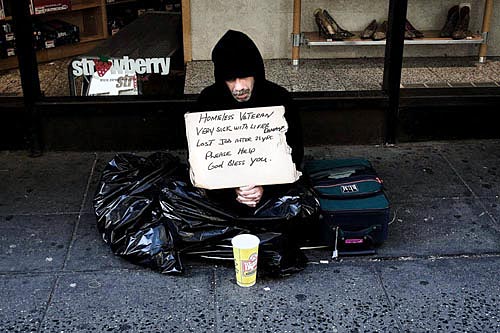
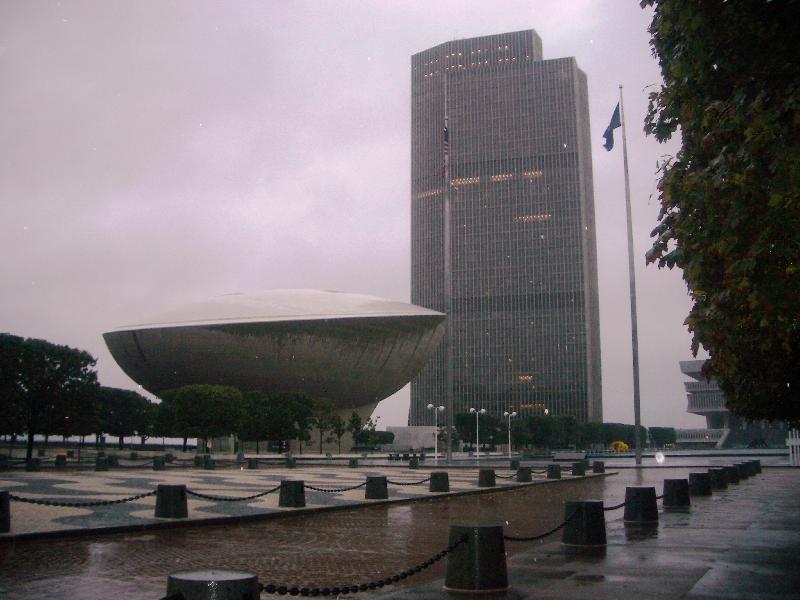
New York City Rent Laws Set To Expire June 15, 2011
Rent and tenant protections for half of all New York City renter households plus thousands more are set to expire on June 15, 2011. These laws have been the foundation for affordable rental housing for middle-class and low-income New Yorkers. If the rent laws are not renewed, it could lead to unprecedented evictions and homelessness could spiral even further out of control. It’s explained in the above linked article by Patrick Markee Senior Policy Analyst at the Coalition for the Homeless, titled Tell Albany: Renew and Strengthen Rent Laws.
Patrick Markee:
- Two out of three households in New York City are renters. Half of all New York City renters are protected by rent and eviction protection laws that go back 60 years to the New Deal era.
- Right now the stakes are as high as they could be and the political environment is as bad as it can be.
- We have a governor who’s been strongly supported financially by the real estate industry.
- Fortunately we have a state assembly there that is strongly pro-tenant. Half of all New Yorkers are rent stabilized apartments which means rent increases are regulated each year.
- The fundamental protection for tenants is they can’t be evicted except for just cause.
- Those protections have been weakened by vacancy destabilization. Because of that we’ve lost 300 thousand rent stabilized apartments over the last decade and a half.
- Right now we have 39 thousand people including 16 thousand children bedding down in the municipal shelter system.
- Just this past month we’ve reached the highest census in the shelter system since the city has been keeping records. Forty percent more people are cycling through the shelter system than when (mayor) Bloomberg took office in 2002
- We’ve had a perfect storm, loss of affordable rental housing across the country, due to Bush Administration cut backs, at the same time, we get the economic recession, and unemployment, add on top of that the foreclosure crisis. 3 out of 4 homeless people are families with kids.
- New Yorkers have a state constitutional right to shelter.
- Contact Governor Cuomo, contact your state legislator.
Guest – Patrick Markee, Senior Policy Analyst at the Coalition for the Homeless and writer of many of the fine articles on the Coalition For the Homeless website.
———-
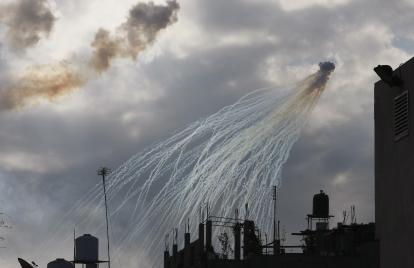
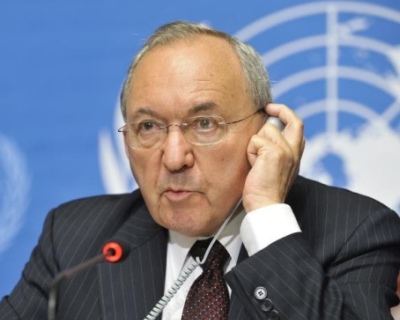
The Goldstone Report Now Belongs to the World
Lead author of The Goldstone Report, detailing the 2008-2009 Israeli assault on Gaza has changed his position on the issue of targeting civilians. In an editorial by the Washington Post, Judge Richard Goldstone said, “Civilians were not intentionally targeted [by Israel] as a matter of policy.” And then Israel has called on the United Nations to retract the report on Operation Cast Lead, the war that led to the death of about 1,400 Palestinians, including hundreds of civilians, and 13 Israelis. Earlier this year, Law and Disorder talked with co-editors of the book titled, The Goldstone Report: The Legacy of the Landmark Investigation of the Gaza Conflict.
Phil Weiss:
- Our book came out 2 years after the Gaza conflict and people said why now, who cares about this? Now we see why.
- This statement by him (Judge Goldstone) was immediately seized upon as a disavowal of the report by many supporters of Israel.
- Prime Minister Netanyahu of Israel immediately called on the UN to withdraw the report.
- The US State Department came out and said this just shows there were no war crimes committed during the Gaza conflict.
- What remains in the Goldstone Report? Geneva Convention: Principle of Distinction and Disproportional Attack
- Other important crimes noted in the report: using white phosphorus, targeting infrastructure, destroying a water treatment facility, destroying a flour mill, destroying food production.
- Even you have a military target, you have to attack that proportionately. One Israeli commander said, we don’t want a hair of our soldiers to fall here.
- This (Gaza) is the size of the Bronx and Queens put together
- The central case that Goldstone based his reconsideration was one of the most horrific cases during the war.
- That took place on January 4, 2009 in a village outside of Gaza City.
- The Israelis were trying to secure parts of Gaza City from the east. They seized this area as a strategic base. They had herded 120 members of an extended family into one house. They had forced them to stay there for a couple of days.
- In the midst of this operation, on that morning, helicopter gun ships came and shelled that house, killing 29 people. In the report Goldstone offered this as another case of targeting civilians.
- I would say “because” this report came out, Israel has produced evidence that the helicopter gunship guys misread drone images. Showing men carrying firewood back to this house as being men carrying rocket launchers.
- Goldstone is saying, I accept the Israeli version here, I think that it was out of negligence or a mistake.
- This reconsideration has got more attention than the whole report.
- This fall the UN General Assembly could vote to establish to make Palestine, a Palestinian state.
Guest – Philip Weiss, founder of the blog Mondoweiss, longtime journalist and regular contributor to the Nation and a fellow at the Nation Institute Philip is the author of two books a political novel, Cock-A-Doodle-Doo, and American Taboo, an investigative account of a 1976 murder in the Peace Corps in the Kingdom of Tonga. Weiss is one of the editors of The Goldstone Report: The Legacy of the Landmark Investigation of the Gaza Conflict.
——————————–
CIA Sponsored Terror, Civil Liberties, Criminalizing Dissent, Habeas Corpus, Human Rights, Prosecution of the Bush Administration, Surveillance, Targeting Muslims, Torture, Truth to Power
Podcast: Play in new window | Download
Updates:
——
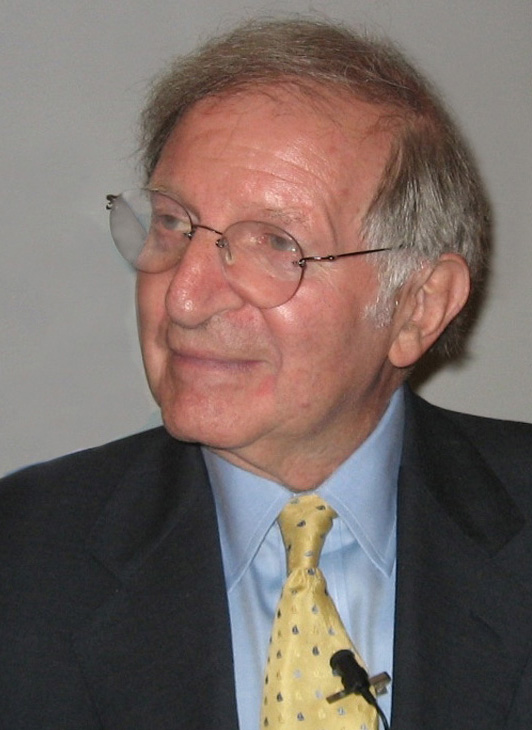
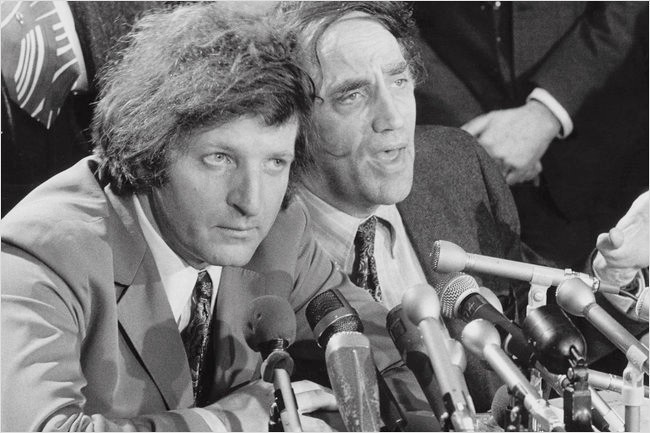
In Memory of Attorney Leonard Weinglass
Hosts remember one of the great civil rights attorneys, Leonard Weinglass from his early years as a lawyer in the Air Force to his big cases. Michael Smith shares a great anecdote. Len vigorously defended a black soldier and upset the Air Force brass. They sent him to Iceland for 2 years. Much later in the late fifties, he moved to Newark, NJ, set up a one man office and represented black people in police abuse cases.
The remarkable and heroic progressive lawyer Len Weinglass died on March 23. Among his cases were the Chicago 8, the Ellsberg case and the Cuban 5. He was our close comrade and will be missed by his friends and all those seeking a better world. – Michael Ratner.
——–
A Poem for Len Weinglass by Linda Backiel
Almost Ready
“I have everything almost ready for the spring,”
you said. Brush cut, brambles cleared, new trees
planted. A lop-sided smile flit across your silver
stubble beard, a late winter field momentarily lit
by a break in a fleet of migrating clouds.
click for more
——–
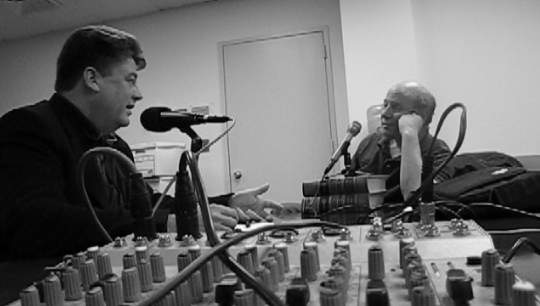
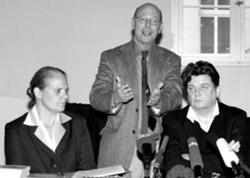
Universal Jurisdiction: Attorney Wolfgang Kaleck
Co-host Michael Ratner interviews attorney Wolfgang Kaleck, German civil rights attorney and General Secretary for the European Center for Constitutional and Human Rights. They discuss the effectiveness of Universal Jurisdiction cases. The cases that helped international human rights prosecutions. Specifically the cases in Argentina against corporations that profited from dictatorships and human rights abuses and how Argentina can be used as a model to bring cases against other powerful leaders or corporations. Optimism overcomes cynicism, Wolfgang says its not easy, it’s work bringing cases against the powerful of the world.
Attorney Wolfgang Kaleck:
- I have the privilege to work on behalf of Germans and Argentinian victims of the Dirty War between 1976 and 1983 in Argentina.
- The Argentinian cases and the Chilean cases were the most important phase in universal jurisdiction.
- We filed cases in Germany, Italy and France.
- The idea to file Argentinian and Chilean cases in European courts was not to try Argentinians and Chileans in Europe but to impose accountability in Chile and Argentina.
- That’s what people call the Pinochet Effect.
- In 2005 and 2006 when the amnesty laws were abolished. If you go to Buenos Aries now you will observe military junta tribes from Monday to Friday and you will police officers, military leaders, torturers, guards.
- At this point, special prosecutors and parts of the civil society are demanding an investigation and prosecution into crimes committed by corporations who aided and abetted the dictatorship, or who profited from the dictatorship.
- The history in Argentina, 30 thousand people disappeared, 100 thousand were tortured.
- The human rights movement in Argentina was so strong, that they maintained a certain presence, a certain public attention.
- For us, Argentina is like the blue print. They inspired the human rights movement not only in Europe
- I filed a case at Mercy Dispense because in Buenos Aires, 15 trade unionists were disappeared. We filed the criminal case in Germany against a German-Argentinian manager who had duel citizenship which allowed us to bring the case in Germany. Then we filed a case in the US, an alien tort claims which is still pending. We filed a case in Argentina which is still pending.
- One line is to blame the torturers and the torturer leaders, we want to talk about why these human rights violations have been committed. Why the Argentinian military took the decision to oppress their populations and our explanation is that they wanted to install a political and economic system which needed the extermination of the trade unionists.
- Actually to demand accountability and do these investigations is trauma work. Society that hasn’t dealt with its past has some problems in the present. Argentina is worth studying as an example.
- Universal Jurisdiction is showing its limits. So far it was very difficult to bring cases against the powerful of the world.
- The suspicion that the criminal justice system is just another tool of the powerful against the powerless,
- We have to try to bring cases against the powerful, Russian, China, the US, or Sri Lanka or Israel, who all undertake actions to avoid prosecution.
- We are very optimistic that some investigation will be carried out in Spain but some people are over-pessimistic, because even now, we achieved that several former US officials, or from the CIA or from the Army, or politicians can’t travel anymore, without running the risk to be arrested.
- We achieved something, I’m also not satisfied from it but still its more than we thought possible.
- President Bush wanted to go to Switzerland.
- It’s always an argument against those cynical people who say nothing is possible. Yes there is, something is possible. We do have to struggle to maintain this, the whole international criminal justice system is at stake.
Guest – Attorney Wolfgang Kaleck, a German civil rights attorney. He is also the General Secretary for the European Center for Constitutional and Human Rights. On November 14, 2006, Kaleck sought criminal prosecution charges in German court against a number of US officials and military personnel in connection with alleged human rights abuses at the prison facilities at Abu Gharib and Guantanamo Bay on behalf of eleven plaintiffs. Approximately 30 human rights activists and organizations participated as co-plaintiffs
Afghanistan War, CIA Sponsored Terror, Civil Liberties, Habeas Corpus, Human Rights, Iraq War, Surveillance, Targeting Muslims, Torture, Truth to Power
Podcast: Play in new window | Download
Updates:
—


“Operation Libya” and the Battle for Oil: Redrawing the Map of Africa
The US and allied air strikes on Libya will have far reaching geopolitical and economic implications. Libya is the among the world’s largest oil economies with near 3.5 percent of global oil reserves, twice that of the United States. What’s going here? As Professor Michel Chossudovsky writes in his article “Operation Libya” and the Battle for Oil: Redrawing the Map of Africa.” there is no such thing as a just war. This is part of US imperialism as drafted in the 2000 Report of the Project of the New American Century entitled “Rebuilding Americas’ Defenses.” One of the main components of this military agenda is: to “Fight and decisively win in multiple, simultaneous theater wars”. Libya counts as the fourth theater of war along with Palestine, Afghanistan, Iraq. In all of this the mainstream media has used a massive disinformation in justifying this military agenda.
Professor Michel Chossudovsky:
- This is not a humanitarian intervention. It is a carefully planned military operation. This was on the drawing board of the Pentagon, well before the protest movements in Egypt.
- It is a war theater, and should be viewed in the broader context of the war theater, namely Iraq, Afghanistan and Palestine. It opens up a new area of militarization in North Africa. It has devastating consequences and is part of a global war.
- The object of coming to the rescue of civilians by bombing with cruise missiles is an absurd proposition. They’re bombing civilian infrastructure. The same agenda as the previous war theaters, they have a list of targets and go ahead and bomb. This whole notion of responsibility to protect is nonsense.
- They’re getting away with it because the media is lying through their teeth.
- Clearly there are Al-Qaeda elements that are supported by the CIA. Two years ago, the Gaddafi government made a deal with the CIA. We know that Al-Qaeda is an intelligence asset. It can be used precisely to create these conditions of insurrection as occurred in Bosnia and in Kosovo. We have to investigate a little more, who is behind the insurgency. The insurgency is not there to win a civil war, the insurgency is there to create a pretext for an intervention.
- I suspect this opposition is heavily divided in any event. Obama has ordered drone attacks in Pakistan.
- The Chinese have sizable interests in Libya. This is also directed against France and Italy, its France and Belgium that are being shoved out of Central Africa.
- Libya borders on Niger, its the entry into central Africa. Niger is important because it has large reserves of Uranium, which is in the hands of a French conglomerate.
- The conquest of Libya is the battle for oil, the same logic as Iraq.
- I estimated that Muslim countries have about 65-75 percent of global oil reserves. That is why we’re demonizing Muslims, they happen to inhabit.
- Bahrain and Yemen peaceful protesters getting hit with nerve gas.
Guest – Professor Michel Chossudovsky, director of Global Research.ca , Center for Research on Globalization. An independent research and media organization based in Montreal, Quebec, Canada.
————-
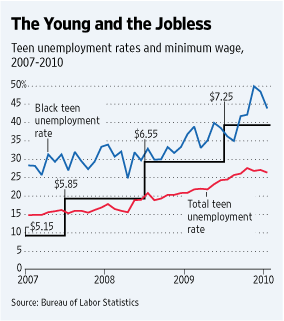
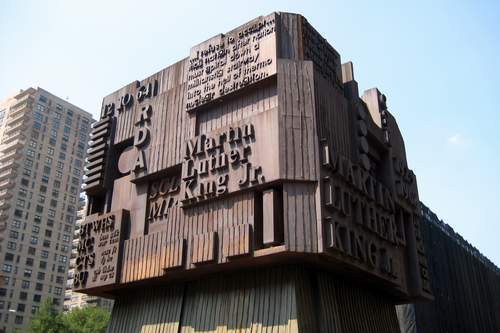
Community Service Society Report: Black Youth Unemployment
Unemployment in a jobless economic recovery has hit young African American men the hardest according to a recent report by the Community Service Society. PDF The highest unemployment rate in 2009 was among men 16-24 years of age—their overall unemployment rate hit 24.6 percent during the recession. Breaking it down by race, young black men had the highest unemployment rate in this group at 33.5 percent. While only one in four black men ages 16-24 have a job in the city, that figure drops to an astounding one in ten for young black men without a high school diploma.
“The recession has created a landscape of the unemployed and underemployed with particular catastrophic consequences for young African American men,” said David R. Jones, president and CEO of the Community Service Society of New York. “We have long known the struggles of the more than 200,000 youth in New York City who are out of work and out of school. Now young black men between 16 and 24 years have become the banner of hopelessness, particularly here in New York City.”
David R. Jones:
- Those who’ve never made the connection to work or those who’ve ceased trying. We’re talking hundreds of thousands of people involved here. African Americans constitute about a third of New Yorkers.
- I think people have to recognize we’re in something totally new.
- At least anecdotally, the Great Depression didn’t have this kind of impact on the black community that this recession is having on them.
- New York in the Great Depression was a segregated city, were working exclusively in black communities or trades that were circumscribed.
- You get pullman porters and restaurant work which were the reserves for African Americans before the civil rights movement hit. The homeless of New York were white on Bowery.
- While we’re seeing a better recovery, the number of long term unemployed is actually greater than New York than other municipalities.
- The trouble is you start to lose job skills, you lose hope, all sorts of with friends and employment start to disintegrate.
- We did a report on security guards and I went back to look at it. There are 63 thousand security guards in the city of New York and virtually none of them are unionized, their average wage was $10 an hour, no health insurance, no paid sick leave.
- New York has an usually high concentration of the working poor.
- We’ve been focusing all our efforts, in terms of how we deal with poverty on the issue of on this nexus between work and getting to a position where they can support themselves and their families.
- This is not limited to the South Bronx or Crown Heights, this is a national phenomenon.
- We know when we did our report on disconnected youth, we had 200 thousand disconnected youth in New York, there were nearly 5 million disconnected youth scattered across the country before the recession.
- We’re never going to go back, to the unemployment levels that we found unacceptable in New York of 5% again. That we’re going to back down from the 9.5 %.
- It was always the expectation, if you worked really hard, there’s was going to be a way, sort of a seat at the table here. New York has one of the highest recidivism rates, we’re doing a couple of things, we’re making it impossible to get work, once you’ve been incarcerated.
- We are going to get a group of young people who feel betrayed.
- I think this scapegoating that has taken on a really powerful voice, is partially because people want to blame someone for why they can’t get employment.
Guest – David Jones, President and Chief Executive Officer of the Community Service Society of New York , a nonpartisan, not-for-profit organization that promotes economic advancement and full civic participation for low-income New Yorkers.
Mr. Jones, an outspoken advocate for low-income New Yorkers, writes bi-weekly newspaper columns in the New York Amsterdam News and El Diario/La Prensa and a weekly blog on the Huffington Post website that serve to educate the public and government officials on issues of importance to minority and poor communities.
——————————-
Civil Liberties, Criminalizing Dissent, FBI Intrusion, Guantanamo, Habeas Corpus, Human Rights, Political Prisoner, Surveillance, Targeting Muslims, Torture, Truth to Power
Podcast: Play in new window | Download
Updates:
————-
In Memory:
The remarkable and heroic progressive lawyer Len Weinglass died on March 23. Among his cases were the Chicago 8, the Ellsberg case and the Cuban 5. Listen to the 4 interviews Law and Disorder did with him over the last 4 years. He was our close comrade and will be missed by his friends and all those seeking a better world. – Michael Ratner.
————-
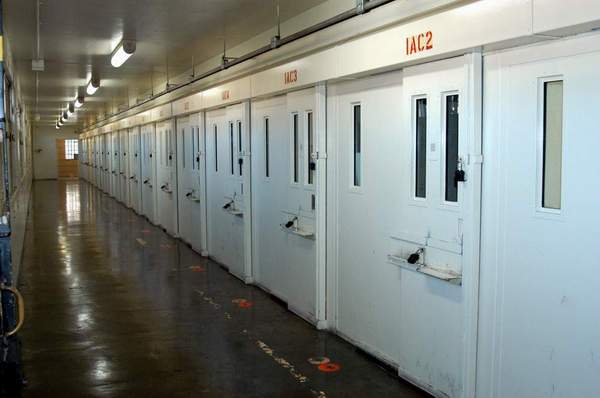
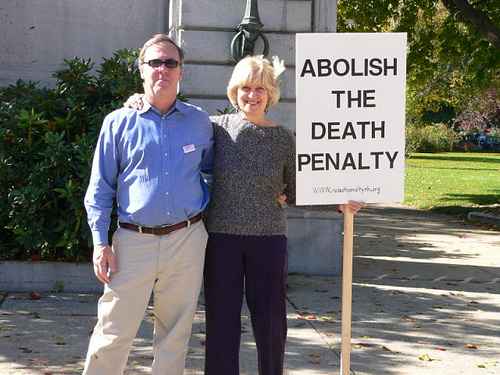
Death Penalty Abolished In Illinois
Last week, Governor Pat Quinn of Illinois signed into law SB3539, which repeals the death penalty in that state. This development is yet another in what appears to be signal a trend of moving away from capital punishment. Early last year we covered the American Law Institute’s declaration that the death penalty in this country has been a failure. Listeners may recall that the A.L.I. created the intellectual framework and justification for the current capital justice system. The movement away from this most final form of punishment seems to be due in large part to the public’s increased awareness about its inherent flaws such as great racial disparity on who gets executed and for what reason. Publicity around exonerations stemming from DNA evidence has also added to general awareness of procedural errors in the system.
Attorney Charles Hoffman:
- In 2003, Governor Ryan cleared out death row, he granted to the 167 men and women on death row and pardoned four.
- that prompted the legislature to pass a modicum of reform. The governor afterward assembled a commission that recommended 85 reforms.
- The legislature passed five or six. The legislature also created a death penalty reform study commission.
- One of the reforms was that all confessions in police custody had to be videotaped in murder cases.
- No matter what safeguards you implement, there’s no system that can prevent the conviction and condemning of an innocent person.
- Prosecutors around the state were asking for the death penalty in cases that weren’t death penalty prosecutions just so the state would bear the costs rather than the county.
- The legislature is cash-strapped and we were wasting millions and millions of dollars prosecuting capital cases when here in Illinois we have the very strict alternative of life without parole.
- Final Report: Death Penalty Legislative Study Committee. Illinois Death Penalty Reform Study Commission PDF
- After Governor Ryan cleared out death row in 2003, Illinois put 17 men on death row. 2 had committed suicide, which left 15 on death row when Governor Quinn signed the abolition bill and also granted sentence commutation to all 15. He commuted their death sentences to life without parole.
- As the problems with the death penalty have been exposed, the arbitrariness, the racism, as mistakes have gone into public consciousness, juries have been rejecting the death penalty.
- Illinois has become the 16th state to abolish the death penalty, following on the heels of New Mexico, New Jersey and New York. The federal government and the military do have it.
- The “deathbelt” in this country is in the South and Texas, and is just a legacy of slavery in this country.
- Most executions occur in former slave states. One obvious flaw of the death penalty, studies have shown the death penalty is most likely to be inflicted in a case when the victim is white and the odds go up even further if the defendant is black or Hispanic.
- Its very gratifying to get rid of this barbaric practice. I represented 35 men and women who were sentenced to death. I do the direct appeals. I’ve had one client executed, I’ve had one client go home.
- Some states have made illegal purchases of the drug. (lethal injection drug shortage)
- Some states are using just one drug, a massive overdose of a barbiturate.
- Life without parole is very draconian, it means there’s no prospect for rehabilitation.
Guest – Assistant Defender in the Supreme Court Unit at the Office of the State Appellate Defender, and member of the board of directors of the Illinois Coalition to Abolish the Death Penalty.
———


Communities Battle Against Gas Drilling To Protect Water, Way of Life
Environmental community groups from New York, New Jersey and Pennsylvania continue to band together and try to protect the Marcellus Shale watershed from natural gas drilling and hydraulic fracturing. The EPA has stated it will investigate how hydraulic fracturing impacts water supplies and water quality in New York State yet the drilling moratorium ends this June. The shale is believed to hold some of the world’s largest deposits of natural gas, and those that want to mine this resource say it will reduce dependence on foreign oil and boost the economy. However, many have shown this statement to be false as the natural gas from the United States is being sold to foreign countries such as Norway and France.
Ninety percent of the New York City’s drinking water comes from ground zero of where various oil companies want to drill into the Marcelle Shale for natural gas. Environmental and public health costs are enormous for each well. Every time a well is drilled, the companies use an estimate of 5 to 9 million gallons of water. Each time a well is fractured, it’s another 5-9 million gallons of water, a well can be fractured multiple times. Up to 275 different toxic chemicals are used in the process and after the well is drilled, there are millions of gallons of industrial waste, it’s essentially radioactive water. 40-70 percent of this water stays underground. The hydro-fracturing process has no federal regulating body. Some of the companies involved are Halliburton, Chesapeake Energy, Fortuna, and Talisman Hess.
Tracy Carluccio:
- My organization has been working on the issue for a few years to try to keep gas drilling from moving ahead.
- Right now there is a moratorium in place on the Delaware River Watershed. It took a year and a half to get that into place. Regulatory measures that are in place now for gas drilling are not doing their job.
- The bottom line is we’re facing an industry that wants to move ahead.
- The industry is very strong. There are international concerns.
- They’re backed by the government in many ways, they enjoy subsidies.
- This industry is going to move like heck to drill everyplace gas can be gotten.
- The Delaware River Watershed has its origins in the Catskill region of New York State.
- The east and west branches come together in Hancock, New York.
- 330 miles from Hancock to the Atlantic Ocean.
- The watershed is 13 thousand square miles and includes four states. It’s overseen by an agency that was born out of water wars.
- Back in the 1950s, all the states were suing each other about who would get water for development.
- In 1961, there was a Supreme Court decree and compact and President Kennedy signed a document that began the Delaware River Basin Commission. As a result of this compact, a large part of the Delaware River goes to New York City.
- There have been regulations federally (Represented by the Army Corp of Engineers) and regionally laid out by the Delaware River Basin Commission
- New York moratorium on gas drilling is tied to late June when there is supposed to be a new draft of the Draft Supplemental Generic Environmental Impact Statement on high volume hydraulic fracturing.
- In order to crack the rock to get at the gas is intrinsically polluting and there’s no way out of that.
- The question of how to stop it is tied to the scientific analysis free from bias.
- Without that bottom up movement, without that cry for government regulators, the industry would be moving ahead exactly as planned.
Guest – Tracy Carluccio, deputy director with Delaware Riverkeeper Network. Delaware Riverkeeper – a watershed wide advocacy program, Delaware Riverkeeper Network takes a strong stance on regional and local issues that threaten water quality and the ecosystems of the Delaware River and its watershed. In fact, Delaware Riverkeeper Network is the only advocacy organization working throughout the entire Delaware River Watershed.
—–
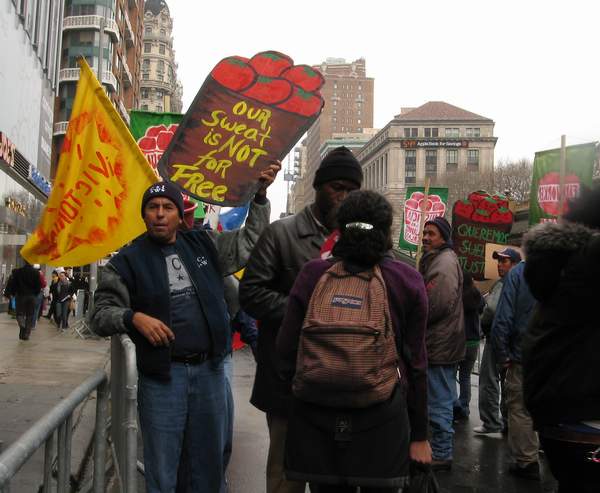
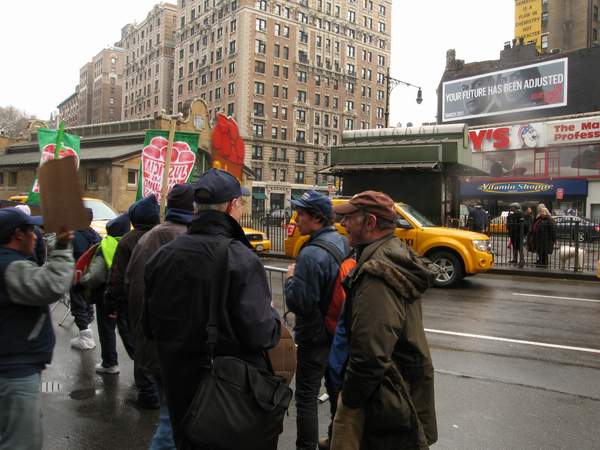
Farmworkers, Consumers Protest Trader Joe’s Demanding Fair Labor Standards for Farmworkers
Late last month, a busload of farm workers from Florida joined members of the NYC Community Farm worker Alliance at Trader Joe’s Upper West Side store. Men and women who pick tomatoes under very harsh conditions demand to be treated more humanely and with improved farm labor wages. Our own Michael Ratner was at the demonstration, we hear some of the interviews.
———————————————————————-
Civil Liberties, Criminalizing Dissent, FBI Intrusion, Guantanamo, Habeas Corpus, Human Rights, Prison Industry, Supreme Court, Targeting Muslims, Torture, Truth to Power
Podcast: Play in new window | Download
Updates:
—
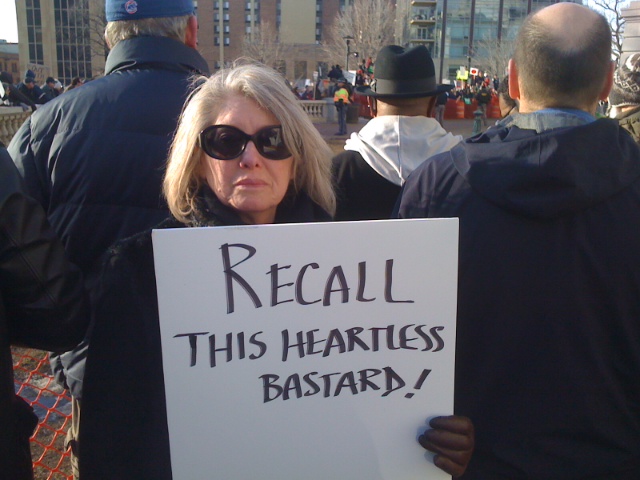

Wisconsin Labor Demonstrations Update
Organized labor is in the cross-hairs to be taken apart by the American elite. Last month, 10 thousand people continued a multi- day occupation of the Wisconsin State Capitol building while tens of thousands chanted outside. Meanwhile the country is gripped by the drama unfolding in Wisconsin and it has inspired unions in other states to move in solidarity. Among those states are Montana, Indiana, Ohio, Michigan, Pennsylvania and New Jersey. Listeners may remember that Wisconsin trade unions have already conceded to wage and benefit cuts. Now the state is voting to repeal Section 11170, the Public Employee Bargaining Chapter. Update: Wisconsin GOP Allows State To Fire Employees For Strikes, Walkouts
Attorney Lester Pines:
- Governor Walker is clearly a stocking horse for the far right wing of the Republican Party.
- I’m not surprised at his behavior, he behaved this way as a Milwaukee County executive.
- I told people he was going to try to repeal section 11170 which is the Public Employee Bargaining Chapter
- What’s at stake is an attempt by the governor and the legislature to strike at the heart of the Wisconsin tradition of organized labor.
- Public employee bargaining has been in Wisconsin for 50 years. This is an attempt to tear apart generations of how Wisconsin operated.
- On a federal level, this is an attempt to wipe away outside groups that democratic and progressive candidates.
- Wisconsin has a bi-annual budget. The legislation is part of budget repair bill. In that legislation is a bill to eliminate all collective bargaining for all municipal and school district employees as well as for state employees.
- There will be no bargaining if this bill passes. The only thing that can be bargained with is wages.
- The bill also imposes a cap on wages. These are designed to essentially make it impossible for public employee unions to function in any meaningful way.
- Scott Walker didn’t talk about what he would actually do.
- If we look at the mass demonstrations in Madison. These are the biggest demonstrations I’ve ever seen here.
- Impeachment is impossible because Republicans control the legislature and Senate, however he can be recalled.
- The Democrats can’t be arrested in a criminal sense,
- Governor Scott Walker has reignited the progressive movement in Wisconsin.
- Until you get these Republicans out of office they’re going to do a lot of damage. They’re nihilists. They care nothing for public services. They care only for what their corporate puppeteers want them to do.
- It looks like this whole anti-public union movement was actually planned out amongst all these new governors.
Guest – Labor attorney Lester Pines, in practice since 1975, he leads the Litigation area, concentrating in civil trials, criminal defense, labor & employment, and business. A Fellow in the American College of Trial Lawyers, Mr. Pines is a highly respected civil and criminal litigator who has appeared in courts throughout Wisconsin and litigated federal matters in Wisconsin, Illinois, Iowa, Ohio and New York.
————————–
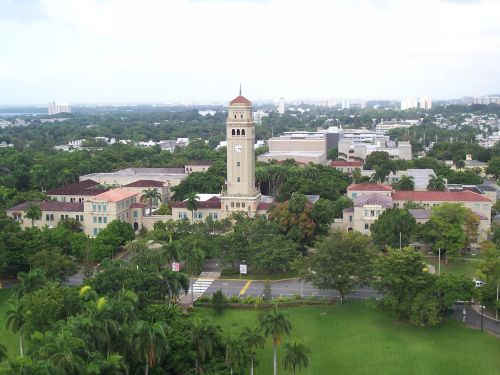

Human Rights Crisis Continues In Puerto Rico
More than a year ago nearly 100 thousand people took to the streets of San Juan, Puerto Rico to protest the lay off of about 17 thousand public employees. The demonstration shut down all state-owned enterprises including the island’s schools and colleges. Two days before that strike the governor passed a bill aimed at dismantling the Bar Association. Protesters were warned that if they stopped commerce, particularly the docks and airports, that action would be sanctionable to federal law. Now, as human rights violations continue, as students and faculty demonstrate against dismantling of progressive curriculum and tuition hikes. ACLU of Puerto Rico, “Human Rights Crisis in Puerto Rico: First Amendment Under Siege.” Law and Disorder Interview with Judy Berkan October 2009
Attorney Judy Berkan:
- Wholesale attack on institutions of Puerto Rican society where any dissent could be lodged.
- The Puerto Rican Bar Association, a real forum for those without a voice. Attacks have come to the Bar Association, elimination of mandatory Bar membership and imposed draconian restrictions upon the Bar Association. They took away a great deal of our funding.
- The president of the Puerto Rican Bar Association was jailed for speaking out against a lawsuit that could take away life insurance from poor lawyers.
- There’s a one month prohibition on leafleting and expression in the University of Puerto Rico.
- The closing of the legislative chambers. Right now there is a US Department of Justice investigation and talk of a trusteeship of the police department here.
- The use of the tactical operations of the police to repress dissent has been intensified.
- All of our public spaces are being closed off to legitimate dissent, while people engaged in peaceful dissent are being attacked.
- Austerity: Part of the remedy of the economic crisis there was an increase in tuition of 800.00. But much more at stake.
- More than that there is question of the vision the University of Puerto Rico will take in the future.
- The emphasis appears to be on privatization as it is throughout the government. We been suffering these programs since 2009.
- We were the guinea pigs. There’s more violence here, if we occupied the state house here, we would’ve been met with pepper spray, gas and beatings as we were when we attempted to demonstrate outside the state house last June.
- The economic programs are really the model that’s being used by Republican governors in the US
- The University situation is really wallowing in the wind without a real solution.
- The Bar Association and their presence is very crucial to public debate in Puerto Rico.
- I think people are getting tired, we do have 2 more years left of this administration.
- The police department is still in the hands of a former FBI agent who has openly encouraged violence against protesters. We have a raging crime rate.
- What’s distressing for all of us here who care about these matters is the media black out in the United States.
- Are we training people to be managers at McDonald’s or are we training people to think about the future of Puerto Rico?
Guest – Attorney Judith Berkan, is a partner in the San Juan law firm of Berkan/Mendez. She specializes in government misconduct litigation and employment discrimination cases. Berkan worked as an attorney in New Haven, Connecticut before going to Puerto Rico as the staff attorney for the Puerto Rico Legal Project of the National Lawyers Guild, now the Puerto Rico Civil Rights Institute. For twenty-seven years, she has been teaching, primarily in the Constitutional Law area, at the Inter American University Law School in San Juan, Puerto Rico.
A frequent speaker and author of many articles on civil rights issues, she was the President of the Human Rights Commission of the Puerto Rico Bar Association in the mid-1990?s and a member of the Commonwealth Supreme Court’s task force on gender discrimination.
————————–

Left Forum 2011
The 2011 Left Forum convenes this Spring, March the 18 to the 20th. This is the largest annual conference of a broad spectrum of left and progressive intellectuals, activists, academics, organizations and the interested public. Conference participants come together to engage a wide range of critical perspectives on the world, to discuss differences, commonalities, and alternatives to current predicaments, and to share ideas for understanding and transforming the world.
Guest – Stanley Aronowitz Distinguished Professor of Sociology at CUNY Graduate Center, where he is Director of The Center for the Study of Culture, Technology and Work. He has taught at Staten Island Community College, University of California-Irvine, University of Paris, Columbia University, and University of Wisconsin.
——————————————————————————————–


























